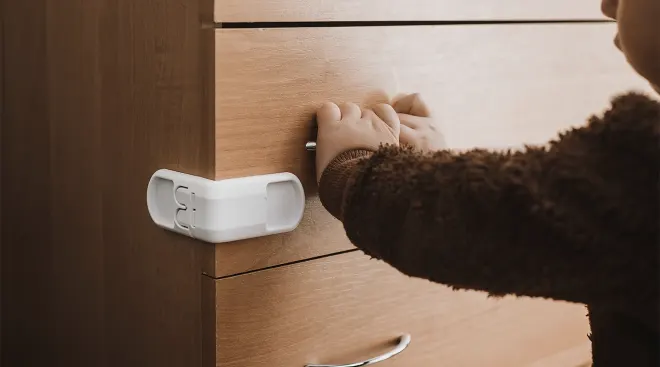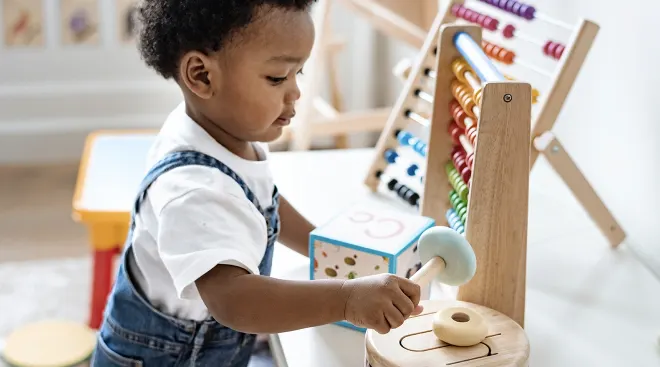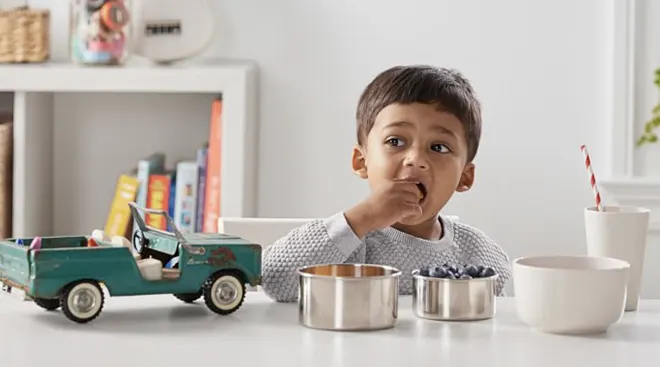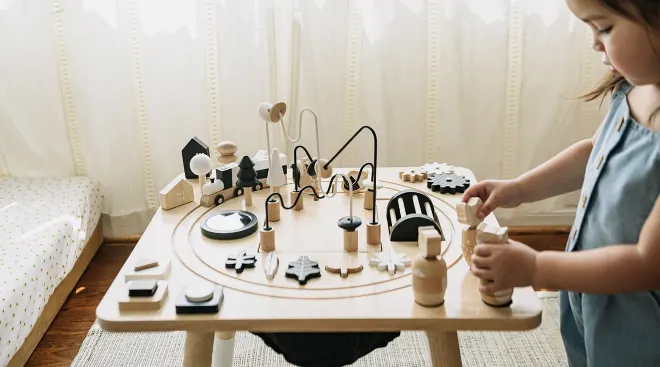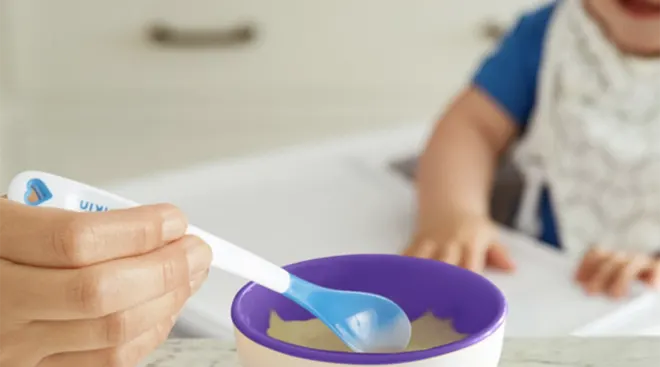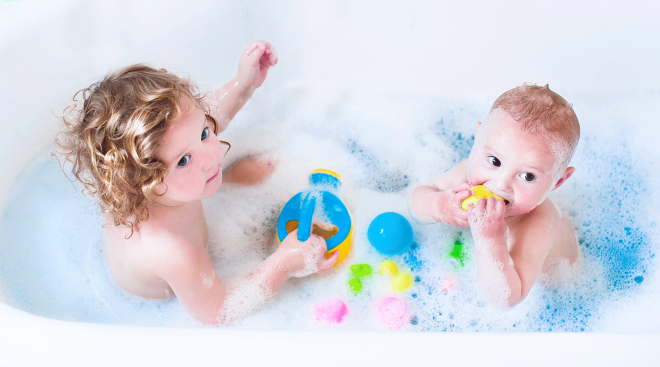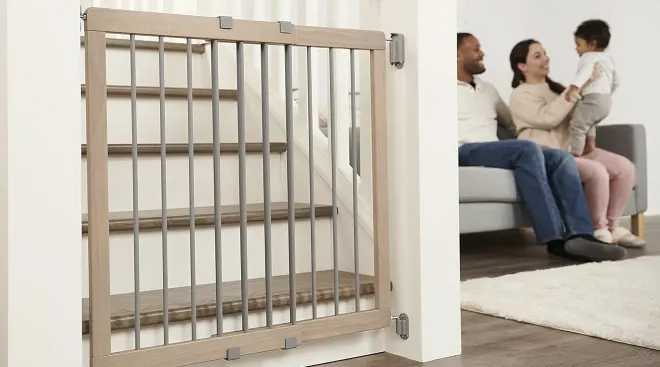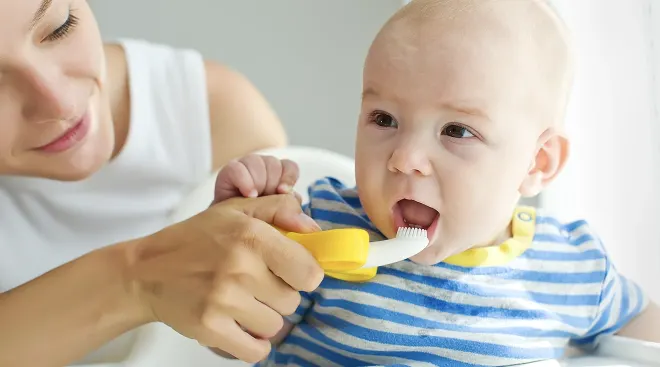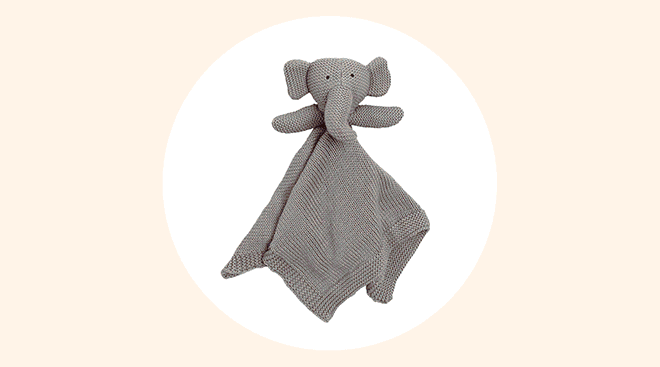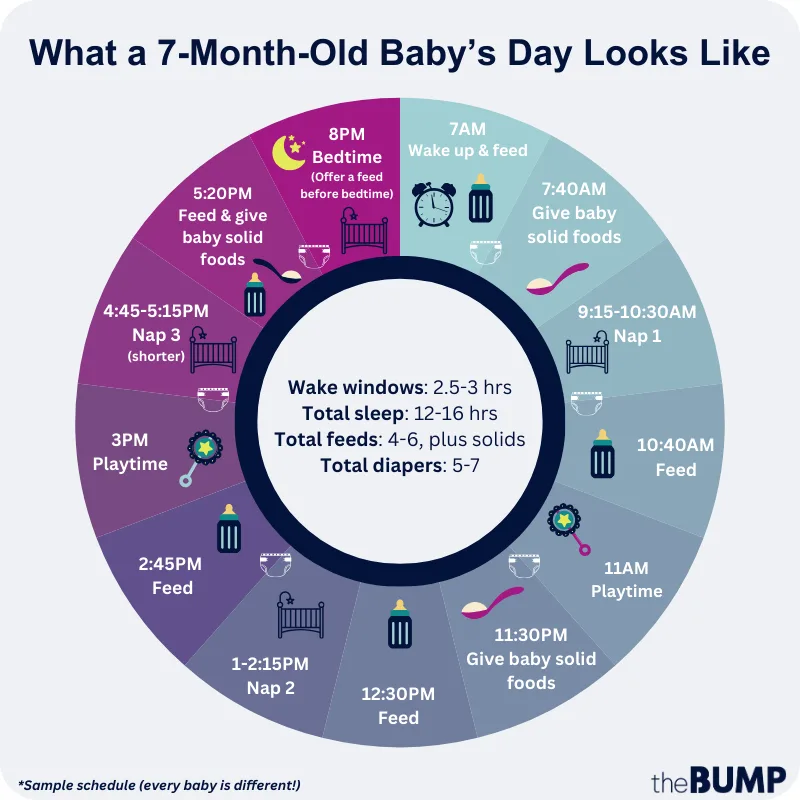7-Month-Old Baby

Baby’s 7 months old! As your little one becomes more active by the minute, it’s time to get your home ready. You may have babyproofed when baby first came home, but having a mini mover and shaker changes everything. Get down on your hands and knees to see what hazards are around that you'll need to guard against. That includes anything baby could tumble over, bump into, get cut or pinched on or get tangled in. Also, make sure anything that could fall onto your child (a dresser, a bookshelf, the TV) is securely strapped into place, and be cautious to keep all choking hazards out of reach—that includes looking for small things that could easily drop on the floor unnoticed, like coins.
As your 7-month-old baby gets stronger and smarter every day, you may find yourself with a whole new slew of questions and concerns. What can I feed my baby at 7 months old? What’s the best 7-month-old sleep schedule? Should you be worried if your 7-month-old doesn’t have teeth yet?
To help you navigate and prepare for the seven-month mark, we’re sharing a guide with all the 7-month-old baby milestones. From schedules to eating routines to fun activity ideas, here’s the intel you need to ensure baby is on a happy and healthy track.
- Baby’s hard at work on important physical milestones like sitting up all by themselves. They might also be attempting to crawl—which can look like scooting.
- Babbling at this stage often sounds like long chains of syllables. You’ll hear “mama” or “dada” soon enough!
- Baby’s likely exploring solid foods. But don’t worry if baby doesn’t want to eat too much yet—their primary source of nutrition should still be breast milk or formula.
Typically, how much should a 7-month-old weigh? The average weight of a 7-month old is about 16.8 pounds for girls and 18.3 pounds for boys. Average length is between 25.7 and 26.5 inches for girls and 26 and 27.2 inches for boys, according to the World Health Organization. In the last three months, baby’s probably grown about 2 to 3 inches and their head circumference may have grown about an inch. They’re still developing the senses and skills that will lead to more independence.
But don’t get too caught up with the “normal” weight of a 7-month-old baby. Height and weight can vary widely between healthy babies, so as long as baby’s growing at a healthy rate—on a steady upward curve on the chart at the doctor’s office—and the pediatrician doesn’t see any signs of a problem, they’re right on track.
Baby is busy! While all babies develop at their own rate, here’s a peek at what might be happening with your baby this month.
- Baby might be able to sit up without your help, though they might have to keep their hands on the floor to stay upright, aka tripoding.
- If baby hasn’t already started crawling, keep an eye out this month. Many babies start making moves as early as 6 or 7 months. However, if they’re not scooting around just yet, don’t worry. They’ll strengthen those muscles and get moving on their own time. And, FYI, some babies skip crawling and go straight to walking.
- Baby’s starting to work on fine-tuning their grasp. Now, baby probably picks things up with their whole hand, but they’ll also soon start working on the pincer grasp, where they’ll pick things up with their pointer finger and thumb.
- Baby bears weight on their legs when you hold them upright, and might even start to jump up and down in this position.
- Baby is starting to babble long chains of syllables (“dadadada!”) and imitate sounds. They know what things to do to attract your attention (and isn’t it adorable?).
7-month-old sensory development
- Baby’s distance vision is improving every day, and they can see everything in full color now.
- The parts of baby’s brain dealing with sound processing have developed, which means baby can fully process and understand a range of sounds.
- Baby’s been listening to your voice and may try to copy the pattern and tones of your voice when they babble. So chatty!
“Babies can control hand movements earlier than speech, so teaching basic signs like ‘milk,’ ‘more’ or ‘all done’ can help reduce frustration and foster a sense of independence. The process of teaching and responding to signs also encourages close interaction, enhancing the parent-child bond. We even have research showing that children exposed to baby sign language may actually have a head start in learning vocabulary.” — Jonathan Williams, DO, aka the TikTok Kid Doc, pediatrician and dad of five
Now that your 7-month-old baby’s likely out and about more, there are a few new health questions that might crop up. Here’s what you’ll want to know this month:
COVID-19 vaccine
The Centers for Disease Control and Prevention (CDC) and the American Academy of Pediatrics (AAP) both recommend that kids 6 months and older get the COVID-19 vaccine. This vaccine has been shown to be safe and effective for babies of this age, with no significant safety concerns shown in vaccine trials. The vaccine is a lower dose than the one given to adults but is still shown to be helpful in preventing serious illness. Baby will need two doses of the vaccine the first time they get it, separated by one month. You can ask baby’s pediatrician for more details.
Fever and common “daycare illnesses”
Since your 7-month-old is probably grabbing at things and interacting with other people more, they’re more prone to developing colds, ear infections and various contagious viruses. Respiratory illnesses like rhinovirus, RSV and the flu are all very common in babies this age. Reach out to your provider if baby has a fever that lasts more than three days, ear pain, breathing difficulties or changes to the coloring of their skin.
Common rashes
Diaper rash is very common in 7-month-old babies. You can usually treat it with over-the-counter creams or ointments, or try applying zinc oxide to form a barrier between baby’s skin and the diaper. Heat rash is also common among babies, especially in hot or humid weather. Eczema is also widespread and usually looks like dry, scaly, red skin that may be itchy. (Learn more about the different types of baby rashes here.)
Diarrhea and constipation
Constipation is extremely common in babies and usually looks like hard, dry stools. If your little one seems constipated, the AAP recommends increasing their fluid intake (at this age, you can give baby water) and giving them more fiber, such as pureed veggies, cooked beans and cooked whole grains. Diarrhea in babies is usually defined by three or more loose or watery stools. It can be caused by a virus, bacterial infection or a reaction to an antibiotic and, in serious cases, can cause dehydration. If baby stops peeing for more than eight hours, has blood in their stool, is vomiting, has a fever or is acting very sick in general, call your pediatrician.
Teething
Got teeth? If your 7-month-old is still all gums, know that some pearly whites will probably pop up pretty soon. Typically, the bottom incisors are the first two to make an appearance, followed by the top incisors. Check out our top teething tips.
Checkup and vaccines
Baby’s next checkup will be at 9 months—make sure to make your appointment! You can expect a developmental screening and growth check. Baby will also likely receive a hepatitis B vaccine and may also get a blood test to check for anemia and a lead screening.
At 7 months old, baby’s diving into the exciting world of solid foods—but their main source of nutrition should still be breast milk or formula. Here are a few important things to keep in mind when feeding your 7-month-old baby.
What can I feed my baby at 7 months old?
What to feed your 7-month-old baby is mostly up to you! There aren’t strict guidelines about when to feed baby certain foods, but it’s best to stick to nutritious, unprocessed foods. If you choose to try baby-led weaning, make sure to give baby finger foods that are soft and cut-up so baby can easily mash them with their gums. Purees also remain great options for you new eater. You can’t go wrong with mashed or pureed fruits and veggies and whole grain baby cereal. Here are some nutritious options.
Be aware that there are a few foods you should avoid giving baby at this point. These include honey, cow’s milk and unpasteurized and/or raw foods. Try not to give baby foods that are high in salt or sugar. Finally, avoid items that pose a choking hazard (hard veggies, whole nuts and anything cylindrical that can block an airway, such as whole grapes or hot dogs).
How much should a 7-month-old eat, and how often?
- Breastfeeding: Seven-month-olds still typically nurse about every three or four hours, but this can vary based on baby’s needs. If you’re having new issues, it’s a good idea to check in with a lactation consultant.
- Bottle feeding: A 7-month-old baby typically drinks about 6 to 8 ounces of formula, four to six times per day, but again, this can vary based on baby’s unique needs.
- Pumping: If you’re pumping, baby needs a total of about 25 ounces of breast milk per day—so you’ll need to divide that by how many feedings baby typically has. For example, if you feed baby about six times per day, they should get about 4.2 ounces of breast milk at each feeding.
- Solid food: Baby’s likely starting to get two to three meals of solid food each day. Depending on the baby, a meal might be as little as a tablespoon or two or as much as 4 to 6 ounces (8 to 12 tablespoons) of food.
Baby might be sleeping better this month—but it’s not a guarantee. Read on for how to get more shuteye this month.
7-month-old sleep schedule
Baby sleeps about 14 to 15 hours per day, with 6 to 11 of those hours being at night. Some babies sleep through the night at this age, but others may still be waking up in the wee hours. It’s typical for a 7-month-old baby to take about two naps a day, adding up to three or four hours of daytime sleep.
If baby’s not sleeping well, it could be a sleep regression—which can happen for plenty of reasons. Babies might start waking in the middle of the night because of illness or teething pain. During a growth spurt, they might be extra hungry and want to feed more. Now that they’re learning how to roll, creep and maybe even crawl, they might wake to practice their new skills in the middle of the night. Or, they might just miss their parents and want some cuddle time! That said, sleep deprivation is no joke: If you’re interested in trying sleep training, this could be the right age to do so.
Baby’s daily schedule seems to be constantly changing and evolving, but this month’s routine probably looks pretty similar to the one they had last month—though we hope you’re getting at least a little more uninterrupted nighttime sleep! Here’s an example of a 7-month-old daily schedule:
Where’d that little newborn blob go?! Your little busy bee loves being active more than ever. Here are some ways to keep a 7-month-old entertained:
- Flip through baby’s favorite board book or a colorful magazine, and describe what’s in the pictures. For more interaction, get some “lift the flap” books or try one that has textured images, so baby can have a full sensory experience.
- Right now, baby’s thrilled by “cause and effect” activities. Find an interactive toy that rewards them for pushing a button.
- Encourage baby to make sounds and repeat after you. They’ll also start to understand more words like “hi” or “dog.” Keep talking, singing and reading to your 7-month-old every day.
- Looking for more games to play with a 7-month-old? Get baby activity ideas here.
As you continue on your parenting journey, taking care of yourself and doing things you love remains super important. At the same time, there are always new parenting skills to learn. Here are some topics that are likely top of mind for you this month:
Postpartum recovery tips
- Stay active as much as you can. Your body’s still healing at seven months postpartum, but being active is important. Try to fit in time for exercise and do whatever is most comfortable for you. Exercise can boost your energy and put you in a better mood. Taking long walks with baby can be beneficial for both of you, and if you’re a runner, getting a jogging stroller and taking baby along can be an option. Pelvic floor exercises are still recommended to help bladder control and to support your recovery.
- Focus on prioritizing yourself. Your mental health is also incredibly important, so as hard as it may be to make time for yourself, it’s essential to try. This might mean asking for help from friends or family members so that you can focus on some self-care. Do whatever makes you feel good and fulfilled, whether that’s making time to read each day, sitting down to watch your favorite show for an hour, scheduling weekly spa or nail appointments or simply getting a little extra rest.
- Make new new-parent friends. Having supportive friends who understand what you’re going through can be incredibly helpful. If you don’t have any friends who are also new moms, look for a new-parent support group in your area—this can be a great way to meet new friends. You can also enroll in some mommy-and-me classes to find moms with babies of a similar age. If you have friends who are also new moms, reach out to set up a lunch date or play date. Or if you really have no time to meet up with anyone, at least find a friend you can text or call regularly to talk to—having someone to vent to can really be helpful.
7-month-old baby care tips
- Work on managing separation anxiety. As baby starts to get a better understanding of object permanence and realize when you’ve left, they start to develop more separation anxiety. The AAP notes that separation anxiety can get worse if baby’s hungry, tired or not feeling well. You can improve separation anxiety by creating consistent good-bye rituals and keeping them short and telling them specific details about when you’ll return (saying things like “I’ll be back after nap time”). You should also practice separating from baby in situations where they feel comfortable, like leaving them at their grandparent’s house without you, especially before a big transition, like starting daycare.
- Foster social-emotional skills. Around this age, you might notice that baby is more fearful of strangers, loud noises and new places or situations. You can make them feel more comfortable by reassuring them that you’re there, encouraging curiosity about everything around them and helping them explore in safe ways. This is also a good age to start playing games like peek-a-boo with baby, which can help them learn more about interaction and shared emotions. At 7 months old, they’ll also benefit from playing with mirrors and responding to expressive emotions.
- Make sure to find a caregiver you trust. Handing your little one over to another caregiver while you’re busy or at work can be tough for new parents. But babies feel more secure, supported and happy when they see their family connecting with their caregiver in positive ways. Feeling like you trust their caregiver completely can take time. To reassure yourself, you can ask for regular updates while they’re with your child—request that they send photos throughout the day, note any special interactions or moments or give you a general idea of what they did while you were gone. You can also pay close attention to how baby acts around their caregiver. If baby genuinely feels comfortable, that’s a good indication that you can trust them.
- Work on introducing water to baby. The AAP recommends that you start introducing water to baby around 6 months by using an open, straw or sippy cup rather than the bottle they may use for breast milk or formula. This can help them develop cup-drinking skills and make them familiar with water. At 7 months old, babies can have between 4 and 8 ounces of water each day—although keep in mind that it shouldn’t replace breast milk or formula.
- Avoid amber teething necklaces. Amber teething necklaces are a popular option to soothe teething pain, but both the AAP and FDA recommend against using them, warning that they can be a choking and strangulation hazard. Experts also recommend against the use of teething gels because many have benzocaine in them and are not approved by the FDA. Safer ways to relieve pain include gum massages, offering a teething ring or wet washcloth or giving baby pain medication like Infant Tylenol, if needed.
It’s a wild world of solid foods, lots more movement and babbling for baby this month! If you’re finding it all just a tad overwhelming, that’s perfectly okay. Sit back and let these parenting triumphs, struggles and advice inspire you—and remember, you’re not alone.
- Win: “Woohoo! We are paci-free! I started not clipping it to her during the day. She didn't even care. I only gave it to her at naptime if she was super fussy and nothing else would work. It took about a month to give that up entirely, cutting out one nap at a time. Then last week, I quit clipping it to her at night… Didn't care at night at all. (She used it to put herself back to sleep, but must've found some other method.) Yay! One less thing to stress about, worry about or find.” — dairygirl19
- Challenge: “I’m a first-time mom; my husband works out of state for at least six weeks at a time and we have two amazing 7-month-old girls. They’re always so happy and content with life, and they seem to be right on track with their milestones. With that being said, they’re right on time with the sleep separation anxiety. At first, I had a pretty smooth, quiet nighttime routine which got them sleeping through the night by the time they were just over 2 months old. But, all of a sudden, one of them will wake up at 11, and it'll take me almost an hour to cuddle and rock her back to sleep. I'll go lay in bed, and before I can even close my eyes the other will be awake and it starts all over. They’ll sleep for maybe two hours if I’m lucky and usually the second round they both wake up screaming together. I know it's just a stage and at some point this will pass, but I feel like I'm failing, because I'm having a hard time doing this alone.” — ebeatty2012
- Wisdom: “At 7 months old, we had all the sleep and feeding issues and saw all the specialists and sleep consultants. In retrospect, provided your pediatrician says everything’s good, my advice is to keep it simple. Sometimes babies just don’t sleep well for developmental reasons. Change up your sleep routine and bedtime ritual—and be consistent with your changes—before turning to outside advice.” — Natalie Gontcharova, senior editor, The Bump and mom of one
"We made sure to solidify our nighttime routine so our son knew what was coming, as well as adjust his nap schedule during the day. Sleep regressions are tough to go through, but remembering your baby is working on things like connecting sleep cycles for the future really helps your perspective." — Lauren M., mom of a 7-month-old in Pennsylvania
Frequently Asked Questions
How can I support my 7-month-old’s motor skills?
At 7 months old, babies should be able to roll easily from back to front, sit up, bounce when being held in a standing position, sit with support, grab at and grasp objects, and bang toys on tables. If they aren’t doing all of these just yet, they likely will soon. To support the development of these motor skills, encourage independence by allowing baby to explore different textures and objects with their hands. Give them toys they can safely hit against something and toys they can stack and knock over, and build towers with them. Encourage movement by giving them rolling toys they can try to chase after.
How many words should a 7-month-old be saying?
While your 7-month-old will be making more sounds than ever before, it’s unlikely that babbling will give way to an actual vocabulary just yet—that usually doesn’t happen until baby reaches 10 to 12 months. Instead, baby will use other sounds to get your attention and might even do some nonsensical babbling, likely long strings of syllables.
How can you wean baby off of nighttime feedings at 7 months old?
By 7 months old, some babies will be done with nighttime feedings while others will still wake to feed. If your little one seems ready, you might want to start night weaning. Before you do, always check with your pediatrician to get the okay. If you’re breastfeeding, you may want to wait a few more months before night weaning, as it can lessen your supply (unless you’re still going to wake up to pump). Regardless, to night wean, you can start by shortening night feedings each night, offering more feedings in the evening hours and teaching baby how to self-soothe.
What do babies remember at 7 months old?
Even if we can’t remember what it was like to be an infant, research shows that infants can still remember things. Infants can remember their mother’s face when they’re just a few days old, and by the seven-month mark can likely remember other familiar faces. Infants can also remember certain events and things they’ve been taught.
Can a 7-month-old eat eggs?
Eggs make some parents nervous because of the allergy risk. In the past, pediatricians used to tell parents to wait until 9 months to introduce egg yolk to baby, and to wait until 12 months to give baby the egg white. But newer food allergy research suggests that it might benefit baby to introduce allergenic foods early and often. So the short answer is yes, you can probably give baby eggs if they’re at least 6 months old, and if they haven’t had an allergic reaction to other foods; talk to baby’s doctor and decide together. (Baby’s allergy risk may come into play.) And as with introducing any new food, watch baby for signs of an allergic reaction in the following days.
If your pediatrician wants you to hold off on eggs, there are still plenty of delicious and nutritious breakfast options to try. Go with blends like banana and apple, peach or berry purees. Oatmeal is often a hit, as is whole-milk yogurt.
Is a 7-month-old sleeping on their stomach okay?
Stomach sleeping is totally fine as long as baby is skillfully rolling over on their own and able to hold up their head and shoulders. Still, for their sleep safety it’s important to put baby to sleep on their back initially.
It probably feels like baby’s marking off the 7-month-old baby milestones left and right, and that’s certainly something to be proud of. Each day is a new adventure as baby grows and learns. If they haven’t started crawling yet, enjoy the serenity while you can. Once baby’s on the move, there’s no stopping them!
Please note: The Bump and the materials and information it contains are not intended to, and do not constitute, medical or other health advice or diagnosis and should not be used as such. You should always consult with a qualified physician or health professional about your specific circumstances.
Navigate forward to interact with the calendar and select a date. Press the question mark key to get the keyboard shortcuts for changing dates.
Advertisement
Advertisement
Advertisement
Advertisement
Advertisement
Advertisement


































